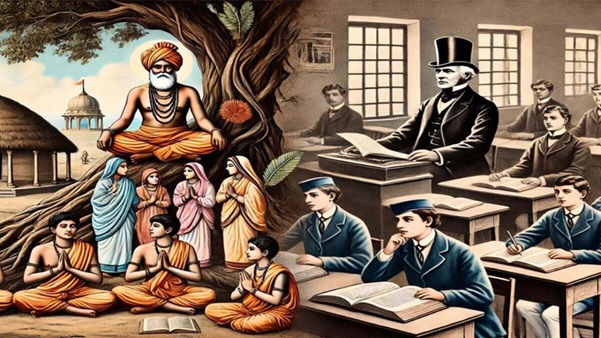| GS-1: (Modern History), GS-2: (Education), Essay, Prelims |
In 1835, Thomas Babington Macaulay presented the “Minute on Indian Education”, a watershed moment in Indian history that deeply influenced education, language, culture, and social structure. It was not merely a document of educational reform but a comprehensive colonial mental project—aimed at weakening India’s cultural foundation and creating a class of people who were Indian in blood but English in mind. The 2025 call by the Prime Minister for a “10-year pledge to end colonial mentality” is a direct response to this legacy.

Prime Minister’s Call for a 10-Year Pledge to End Colonial Mentality
The Prime Minister emphasized that by the bicentennial of the colonial campaign initiated by Macaulay in 1835—i.e., over the next 10 years—India must free itself from a mentality that:
- Regards English as superior,
- Considers Indian languages inferior,
- Treats Western culture as “modern,”
- And deems Indian knowledge systems irrelevant.
According to him, this is not merely an educational reform but a campaign of Cognitive Renaissance.
The 1835 Macaulay Minute: A Decisive Blow to India
Key points of Macaulay’s Minute:
- Indian languages such as Sanskrit, Arabic, Persian, Hindi, Tamil, and Telugu were deemed useless.
- English was presented as the only medium for “high knowledge.”
- Government funds were proposed to be spent exclusively on English education.
- Indian literature, philosophy, medicine, mathematics, and sciences were depicted as inferior to Western knowledge.
- A “mediating class” was envisioned: “Indian in blood and colour, but English in tastes, opinions, morals and intellect.”
This policy directly attacked India’s cultural, linguistic, and intellectual spirit.
Who was Macaulay ?
- Full name: Thomas Babington Macaulay.
- First Law Member of the Council of the Governor-General of India (1834–1838).
- Appointed under the Charter Act of 1833.
- Profound influence on the Indian Penal Code (IPC) and education policy.
Gandhi’s Perspective: Destruction of a “Beautiful Tree”
Mahatma Gandhi criticized British education policy, stating: “India’s ancient education system was a beautiful tree, uprooted and destroyed.”
He implied that India’s Gurukul/Pathshala system nurtured:
- Morality
- Character
- Skill
- Community spirit
- Local knowledge
Macaulay’s policy uprooted this system, laying the foundation for English-based mental subjugation.
Five Dimensions of Colonial Mentality in India
Colonial mentality was not limited to language—it permeated social structure, administration, culture, and thought.
- Language-Based Colonialism
- English became the language of courts, universities, and jobs.
- English was seen as a “ticket to success.”
- Indian languages—Sanskrit, Tamil, Pali, Bengali, Hindi—were excluded from educational competition.
- Non-English speakers were often deprived of opportunities.
- Cultural Colonialism
- Western culture was deemed “superior” while Indian lifestyle was portrayed as inferior.
- Clothing, food, art, literature, music, and architecture were influenced.
- Indian cultural pride diminished; imitation of the West became prevalent.
- Indian knowledge systems were labeled unscientific.
- Legal and Institutional Colonialism
- Laws were designed primarily to maintain British control:
- IPC (1860)
- Sedition Law
- Police Act (1861)
- Forest Laws
- Land and Revenue Laws
- The goal was administrative control rather than citizen freedom.
- Economic Colonialism
- India was turned into a supplier of raw materials and a market for Britain.
- Local industries (handlooms, iron, shipbuilding) were destroyed.
- Massive drain of wealth ensued.
- Result: widespread poverty and economic backwardness.
- Colonial Model of Knowledge and Research
- Western research methodologies were imposed.
- Indian science, mathematics, medicine, yoga, and agriculture were labeled unscientific.
- Indian universities also followed Western paradigms.
Cognitive Decolonisation: The Way Forward
India has now reached a stage where mental freedom is essential. This requires action at three levels: policy, cultural, and behavioral.
- Policy-Level Decolonisation
- NEP 2020: Mother-tongue-based education, Indian Knowledge Systems (IKS), skill-based learning.
- Revision or repeal of colonial laws.
- Restructuring administrative frameworks with Indian values.
- Examples:
- Renaming Rajpath to Kartavya Path—shifting from power display to duty.
- Replacing IPC with new Indian justice codes.
- Cultural Revival
- Restoration of India’s cultural memory:
- Yoga as a global identity—International Yoga Day.
- Revival of crafts, folk art, festivals.
- Incorporating Indian state tradition in New Parliament building.
- Behavioral Change
- Atmanirbhar Bharat: Indigenous innovation, local production.
- Sustainable development rooted in Indian models.
- Example: Mission LIFE (Lifestyle for Environment) promoting environmental responsibility based on Indian lifestyle.
Conclusion
The 1835 Macaulay Minute was not just an educational policy—it was a carefully designed strategy for mental subjugation. It weakened Indian languages, culture, and knowledge traditions while creating an English-centered elite. The Prime Minister’s 10-year pledge signals India’s renewed effort to revive its cultural soul. Cognitive decolonisation, i.e., redefining thought, education, law, and culture from an Indian perspective, is essential for 21st-century India.



